Chiswick Curve Would Cause 'Substantial Harm'
Council planners' report categorically rejects developer's plan
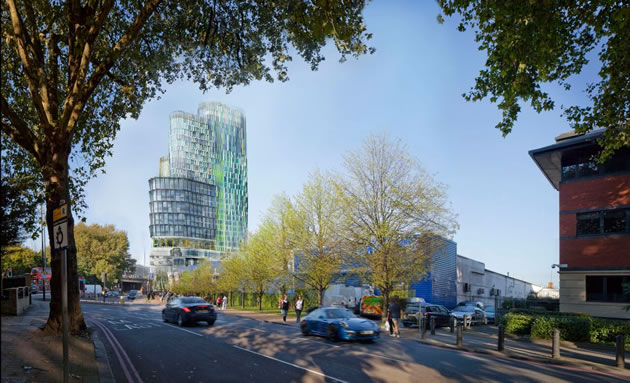
The planned tower viewed from Chiswick Roundabout
Hounslow Council planners have rejected the proposal for the 32-storey Chiswick Curve on several grounds, including its size, and the fact that it could cause "substantial harm." The report rejects the plan categorically allaying fears of local residents' groups that it may leave the door open for the plan to proceed with minor amendments.
A key reason for the rejection is the impact that the building would have on a number of local heritage sites particularly Kew Gardens. They recommend that the current application be turned down.They also said that the large structure would be "at odds with the wider urban and historic character of the area."
The report also criticised the design saying, "The standard of design proposed would not be outstanding or of the highest quality and the proposed provision of affordable housing at the site would not maximize affordable housing delivery or promote mixed and balanced communities."
It also said the development proposed was too much for the site. "The quantum of development proposed at the site is excessive and has eroded the quality of the architectural design."
The planning application for the 32-storey Chiswick Curve will come before next Thursday's (12 January) Planning Committee meeting at the Civic Centre (7.30 pm) for discussion by councillors. Local groups opposed to the project are planning to attend in force.
The report from the planning officers was made available this week in advance of the meeting. It also recommended that the consent for three illuminated signs on the building be refused because "the adverts would undermine the quality of the design of the building and would conflict with the character of the area."
The report commented: "At this time, the building would appear as a very large, distinct structure at odds with its wider urban and historic character of the area. Reductions in the height and massing of the proposal would improve the overall quality of the building and allow it to better fulfill its aspiration as an elegant addition to the urban environment."
Local campaigners are happy at the recommendation for refusal but have urged people to attend the meeting, as councillors are free to come to a different decision than that recommended in the officer's report. The decision was referred to the Planning Committee because of the high level of local interest in the application, which the council said constituted an "exceptional circumstance."
A statement from the West Chiswick and Gunnersbury Society (WCGS) said, "WCGS is pleased to learn that the officer recommendation is that the application for this very harmful 32-storey development proposed at the Chiswick Roundabout should be refused. We strongly endorse this recommendation as the proposed scheme would have a seriously detrimental impact on the local economy, environment and the quality of life of existing residents and any future residents of the development.
"The recently amended proposals fail utterly to address the major objections raised at the beginning of the year by our Society and by many others, including statutory consultees. Many of these objections were based on the proposed development’s lack of compliance with the policies of Hounslow’s Local Plan, the London Plan and the NPPF."
A formal planning application was submitted by Starbones Limited to Hounslow Council on 21 December 2015 for what would be the tallest building in West London, higher than Trellick Tower in Paddington.
However, the matter was put aside for several months pending talks between the developer and the local authority, and campaigners against the proposal continued to voice their opposition to the project.
The amendments proposed by developers, Starbones Ltd, included an increase in the number of housing units, reduction in the retail/restaurant floorspace and a small increase in the office space. It was also proposed that the giant LED digital advertising screens would be reduced from four to three.
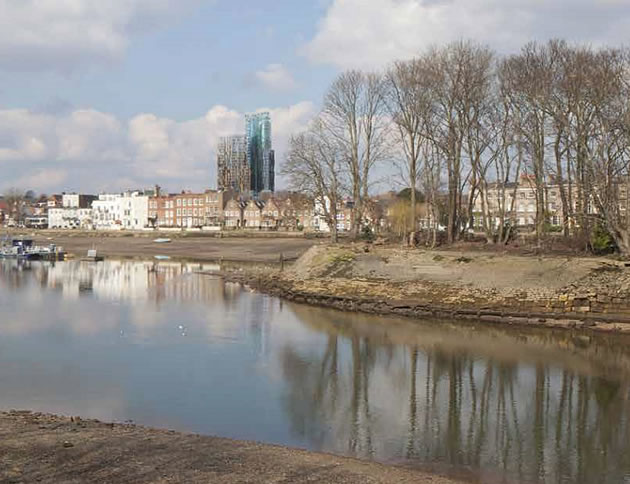
The Chiswick Curve from Strand on the Green
Local groups in Chiswick, Kew and Brentford had been campaigning strongly against the development, including residents' and community groups, conservationists as well as the Green Party, English Heritage, Kew Gardens, and Tony Arbour MLA. Their opposition rested mainly on the grounds that this was an unsuitable site for residential development, that the structure was too high, there would be a negative impact on traffic and public transport, increased pollution, and there was currently a lack of surrounding infrastructure.
Over 17,000 residents were consulted when the application was received and these 17,000 were notified again in November 2016 when the application was amended and further information was submitted. A total of 687 letters of objection were received, and 198 letters of support.
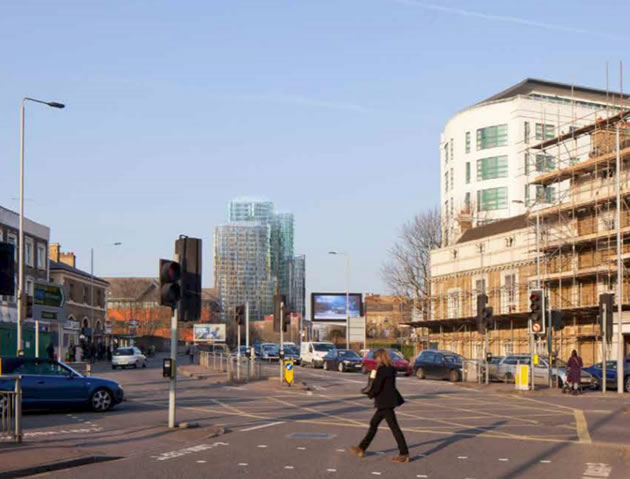
The Curve from Kew Bridge
The site has had a chequered planning history with several attempt to
erect tall buildings in recent years, ranging from a plan for a 26 storey
office building (withdrawn in September 2000) to a Tricorn 13-storey office
block with basement car parking (refused).
In 2012 planning permission was granted for the scheme known as the ‘Octopus’
comprising a retail show room with 3,318sqm of office space, a basement
car park (42 spaces) and external LED advertising. Prior to this, permission
was granted in 2002 for a scheme known as ‘Citadel’ comprising 19,750sqm
office space and 140 parking spaces
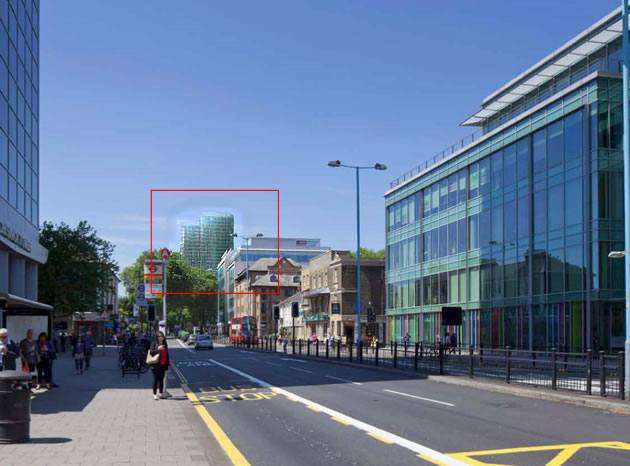
The Curve outside Gunnersbury station on Chiswick High Road
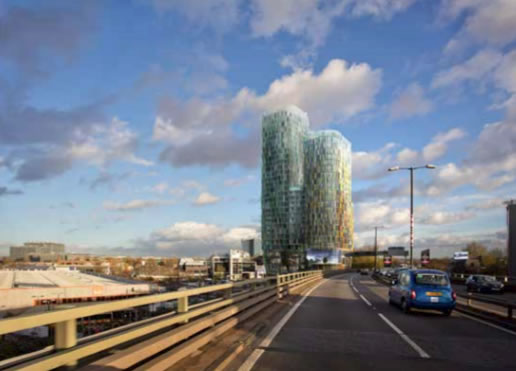
A view from the A4
January 7, 2017